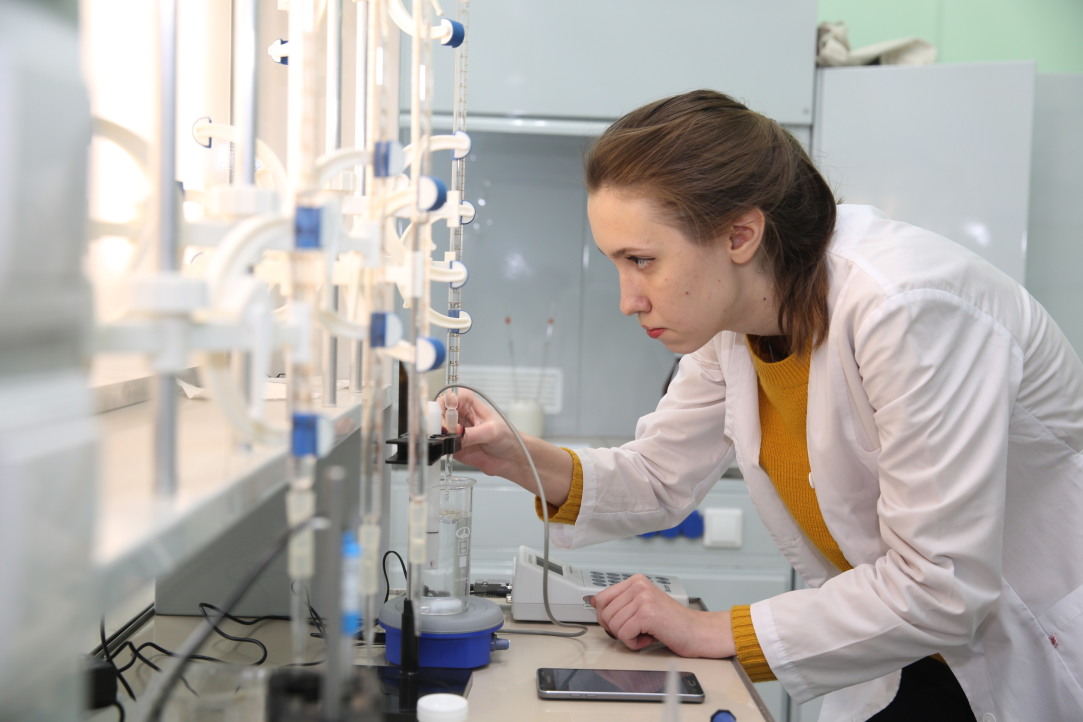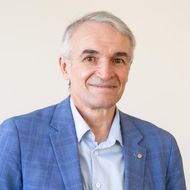‘We Want to Share Our Research with the Whole World’

The HSE University Faculty of Chemistry opened three years ago, and its first intake of undergraduate students is set to graduate in 2023. These students have already demonstrated impressive results in their research—half of second and third-year students have publications in journals indexed in WoS and Scopus, almost a third of which are in Q1 journals. Andrey Yaroslavtsev, Head of the Chemistry programme and Academic of the Russian Academy of Sciences (RAS), told the HSE University News Service about the secret of this success.
Bringing chemistry to HSE University
‘When we at the RAS were thinking about how to give new impetus to our activities, HSE University was the first thing we thought of,’ says Andrey Yaroslavtsev. The choice was based on the fact that HSE University is a young and ambitious university that had already achieved much, but was not involved in chemistry at the time.
The first intake of bachelor’s and master’s students at the Faculty of Physics took place in August 2017. The following year, in October 2018, the HSE University Faculty of Chemistry opened with support from the RAS.

Andrey Yaroslavtsev, Head of the programme in Chemistry
‘We hope to make the most of one of HSE University’s defining features: the drive of its graduates to take innovative approaches and the fact that many of them have an entrepreneurial streak. Russian scientists are not always focused on the practical implementation of their ideas. We hope that our graduates will help us solve this complicated problem.’
Today, the HSE Faculty of Chemistry has joint departments with five RAS institutes:
The Zelinsky Institute of Organic Chemistry
The Kurnakov Institute of General and Inorganic Chemistry
The Nesmeyanov Institute of Organoelement Compounds
From school desks to research
On July 30, 2019, the award ceremony of the 51st International Chemistry Olympiad took place in Paris. All four members of the Russian national team received gold medals. Among them was Moscow high school graduate Daniil Bardonov. That summer, he enrolled in the recently opened Bachelor’s in Chemistry at HSE University.
Daniil Bardonov
My interest in chemistry started in the eighth grade. I asked several scientists I knew from olympiads about the teachers at HSE University. They said that they were good, so I thought ‘why not?’
When you go to high-level olympiads, you prepare using university textbooks. You already know pretty much all of the university material in the main disciplines: organic, inorganic, and physical chemistry. I didn’t expect the core subjects to be very interesting. But our programme had good courses that I liked, such as Theoretical Inorganic Chemistry and Clusters and Organoelement Compounds. And I’m looking forward to the various courses planned for the fourth year.
I have been doing research since my first year and I plan to continue. I would like to go on to do a master’s, then a doctoral programme, defend my dissertation, and study chemistry—likely f-block-element chemistry.
I have four articles—all in English and all written with co-authors, because modern science is collaborative science
You can’t do anything on your own. You need someone to deal with the lab instruments, the reagents, etc, someone who organises all of that work. You need a supervisor—like I have—to discuss ideas with and then implement them. You also need people to analyse the substances obtained. So we always have a large group of co-authors. We always have a minimum of four people, but usually six to eight.
We want to share our research not just with the country, but with the whole world. That is why we often write our articles in English. My two favourites out of the articles we have published so far are ‘Cyclopentadienyl lanthanide borohydrides derived from the unsubstituted cyclopentadienyl ligand. Unprecedented structural diversity and ε-caprolactone polymerization’ in Inorganica Chimica Acta and ‘Ligand-to-ligand charge transfer state in lanthanide complexes containing π-bonded antenna ligands’ in Mendeleev Communications.
Chemistry in medicine
Victoria Besprozvannykh, a classmate of Daniil’s, chose HSE University because she wanted to do research from the first year. The experience has lived up to her expectations, and she has published two research articles.
Victoria Besprozvannykh
I graduated from high school the same year the HSE University Faculty of Chemistry opened. I decided to apply, because the concept of the programme included a lot of practical and research work from the first year. Plus, HSE University has well-developed extracurricular activities and a lot of interesting events.
We created a research and study group based on the RAS Topchiev Institute of Petrochemical Synthesis and are now in our second year of productive work. The university helped with the creation of an individual curriculum that allowed me to take an internship in Hong Kong without missing important university classes.
When I first arrived at the lab, my academic supervisor helped me choose a topic and set goals for my research work. We started working on the synthesis of hydroxyapatite, an inorganic component of human bones.
Composite materials based on hydroxyapatite can improve the recovery times of patients after operations on bone tissue—this is a very promising field in medicine
My work involves the direct synthesis of substances and the creation of materials. I have co-authored two articles: ‘Hydroxyapatite of plate-like morphology obtained by low temperature hydrothermal synthesis’ and ‘Simple, efficient and reliable method for the preparation of β-tricalcium phosphate’, both published in Mendeleev Communications. My academic supervisor played a major role in the creation of the articles by organising the work, setting tasks, and distributing responsibilities. Writing an article is always a group effort. For example, last year, we published a very good article on ‘Antibacterial Poly(ε-CL)/Hydroxyapatite Electrospun Fibers Reinforced by Poly(ε-CL)-b- Poly(Ethylene Phosphoric Acid)’ in the highly rated International Journal of Molecular Sciences. In addition to our lab staff, colleagues from the medical institute and microbiologists worked on it.
Science in practice
Andrey Manin has been interested in chemistry since the fifth grade. This interest has only grown over the years, and he has taken part in olympiads and summer schools. He enrolled in HSE University after hearing the opinions of students from the first intake of the Faculty of Chemistry.
Andrey Manin
I was confident that during my programme, I would learn about a whole new world of chemistry not on paper, but in the form of real research. And my expectations were justified: I have completed two interesting term papers, prepared two research projects, joined the Composite Nanomaterials for Protecting the Environment research and study group, taken part in conferences and the Student Research Paper Competition, and published a research article in a highly rated journal.
I would like to tell future applicants that HSE University is long established as a full-fledged university with a wide range of educational programmes
My studies at HSE University are very interesting. We learn about subjects that you would rarely see at other chemistry universities. We work with top specialists in their fields. Their professional experience and ability to convey the material at a high level makes the learning process engaging for students. We meet with our instructors not only in lectures, but in laboratories for research work.
I stayed in the lab after completing my term paper—my academic advisor and I decided to expand the experimental part of the paper. After a year of work, we managed to obtain some additional new and interesting results.
Students of our programme have published a lot of research articles in indexed Russian and international journals with HSE University affiliations. I am interested in the academic track and I want to go further into research. I think that when I finish my studies at HSE University, I will have a wide range of opportunities for further professional development in research.
Andrey B. Yaroslavtsev
Head, Joint Department of Inorganic Chemistry and Material Science with the RAS Kurnakov Institute of General and Inorganic Chemistry
